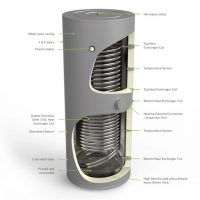As all electric heaters are 100% efficient I can't see how the quantum can be 27% cheaper to run than others.
That depends on how you define efficient, some electric heater manufacturers work out efficiency as "time room required/time heater needs to be on" so if room needed for 2 hours and to heat the room the heater needs to be switched on an hour before hand, then 2/3 x 100 = 66% efficient.
However with a storage heater it is more complex, it would need to be energy required to heat room for 2 hours / energy put into the heater. So in real terms it is down to energy lost while heater not required which is the real thing that needs working out.
So the storage heater in the bedroom would be pointless as you would be loosing heat all day, so you want something to heat up fast so as soon as off peak turns on it is heating bedroom, and lounge/diner wants to store the heat over night and release over the day, so the selection is good.
Only way to improve is to use a central store for heat, i.e. true central heating, but using a central heat store the insulation can be much improved, so with heating output off, the store will take over a week to cool, where most individual units will not store heat for even one day, however the true central heating is more expensive to install and you need space for the heat store.
There are two types of electric central heating I have seen, in a place called Lixwm in Flintshire North Wales in the 70's the council built some council houses with a central heat store, this was in essence a well insulated room in the middle of the house with a heater and bricks in it, and ducts and fans that distributed this heat when required, this clearly needs to be part of the original build can't be added latter.
The other is water
these well insulated tanks allow multi-fuel heating, and in the main are used where solar, solid fuel, electric and LPG are all used to heat the home, I have never seen one used with electric only, however they must be about the most economic way to store heat for use latter, the main advantage is Autumn and Spring where if you have some warm days, heat is not released and even with electric completely off, it will still be hot a week latter. My brother-in-law had one which used energy from solar panels when nothing else was drawing power, he went to Germany regular, and turning heat down a bit in the house it could maintain the house at 16°C without ever using power from the DNO, when at home the wood burner kept everything toasty warm.
I really don't think worth the installation expense, but it is likely the most efficient of all electric systems.
There is also heat pumps, and infrared heating, the latter has control issues, great for a bathroom switch on use room switch off but normal wall thermostats will not regulate it so limited use.
So all in all yes what you suggest is likely the best option, the storage heater says 2.2 kW in will store 15.4 kWh and 1 kW output, so if uncontrolled it would take 12.8 hours to warm up and 12.8 hours to cool down, what is of course hoped is that over night it will not give out 1 kW in fact we hope output is zero which would mean it gains full 15.4 kW in 7 hours, it could then give out an average of 0.9 kW over the day, it will not be zero output at night so average is around 650 watt output. With maximum input at 2.2 kW in 7 hours of 15.4 kWh simple maths average output is 650 watt.
If the unit stated fully charged it will reach half charged in 12 hours with output set to minimum you could compare and work out how much heat would be left when you get home, however they never do, it is such it and see, with Economy 10 rather than Economy 7 the output goes from a 642 Watt average to 917 Watt output average, using the daily boost. In real terms storage heaters worked well in offices, by around 5 pm they were getting cool, but by then everyone was going home, for the house never really that good, cold when you go to bed, gets slowly warmer as night goes on, lovely toasty hot when you leave for work, and hardly anything left when you get home.
If you heat and cool water by 50°C which is reasonable, then to store the same amount of heat as the storage radiator you need 330 litres of water and a standard hot water tank holds around 114 litres, a 250 litre tank costs £716 since less is lost during the day it would likely work, but not included price of pipe work and pumps and radiators, so when you consider how much electric costs, hardly worth while.



